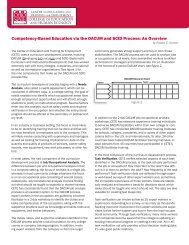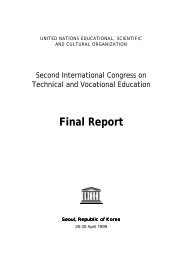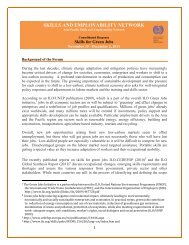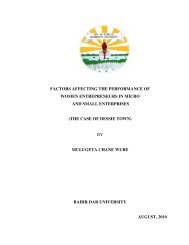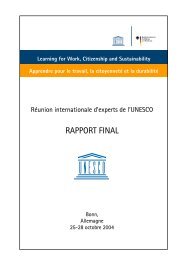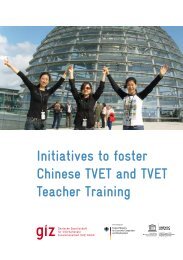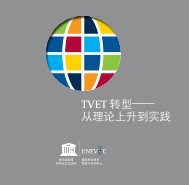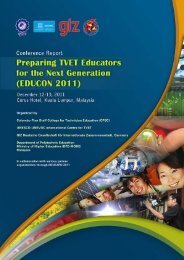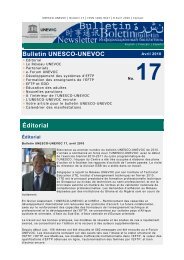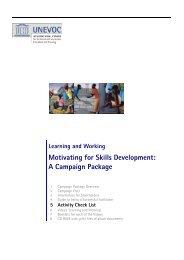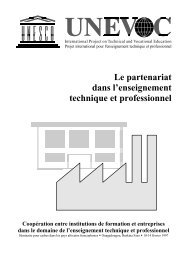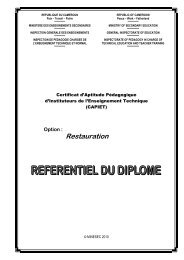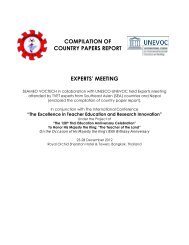Green TVET and Education for Sustainable ... - Unesco-Unevoc
Green TVET and Education for Sustainable ... - Unesco-Unevoc
Green TVET and Education for Sustainable ... - Unesco-Unevoc
You also want an ePaper? Increase the reach of your titles
YUMPU automatically turns print PDFs into web optimized ePapers that Google loves.
water <strong>and</strong> education professionals <strong>and</strong> to develop<br />
needs assessments <strong>for</strong> capacity development, e.g.<br />
to set priorities, <strong>and</strong> establish pilot projects <strong>and</strong><br />
programs to implement capacity development.<br />
However, <strong>TVET</strong> in many countries remains a<br />
mere supplier of skilled labor to industry <strong>and</strong> is<br />
thereby unable to respond eectively to the needs<br />
of the sustainable development strategies. e<br />
complexity, breadth <strong>and</strong> diversity of <strong>Green</strong> <strong>TVET</strong><br />
<strong>and</strong> Water <strong>Education</strong> in pursuit of ESD require that<br />
a wide range of stakeholders ought to become active<br />
<strong>and</strong> cohesive to implement the DESD through a<br />
partnership approach: governments, parliaments,<br />
non-governmental organizations, media, the private<br />
sector, education institutions, research institutes,<br />
individual educators <strong>and</strong> students, among others. In<br />
view of these, boom-up <strong>and</strong> top-down strategies<br />
essential be combined.<br />
As a result, the joint ILO <strong>and</strong> UNESCO<br />
Recommendations on <strong>TVET</strong> <strong>for</strong> the 21st Century<br />
stated that, as “a vital aspect of the educational process<br />
in all countries” <strong>TVET</strong> should:<br />
a. Contribute to the achievement of the societal<br />
goals of greater democratization <strong>and</strong> social,<br />
cultural <strong>and</strong> economic development, while<br />
at the same time developing the potential<br />
of all individuals,both men <strong>and</strong> women, <strong>for</strong><br />
active participation in the establishment <strong>and</strong><br />
implementation of these goals, regardless of<br />
religion, race <strong>and</strong> age;<br />
b. Lead to an underst<strong>and</strong>ing of the scientic<br />
<strong>and</strong> technological aspects of contemporary<br />
civilization in sucha way that people<br />
comprehend their environment <strong>and</strong> are capable<br />
of acting upon it while taking a critical view<br />
of the social, political <strong>and</strong> environmental<br />
implications of scientic <strong>and</strong> technological<br />
change;<br />
c. Empower people to contribute to<br />
environmentally sound sustainable<br />
development through their occupations <strong>and</strong><br />
other areas of their lives.<br />
6 |<br />
International Experts Workshop on<br />
<strong>Green</strong> <strong>TVET</strong> <strong>and</strong> <strong>Education</strong> <strong>for</strong> <strong>Sustainable</strong> Development: Capacity Development Needs <strong>for</strong> Water <strong>Education</strong><br />
September 13-17, 2010 | Munich, Germany<br />
In this framework, <strong>TVET</strong> ought to open a window<br />
to the world <strong>and</strong> vice versa. For example, <strong>TVET</strong><br />
institutions ought to explore <strong>and</strong> exchange<br />
in<strong>for</strong>mation about innovative teaching <strong>and</strong> learning<br />
methods, such as programs on clean energy, clean<br />
water <strong>and</strong> clean technology, reorientation of <strong>TVET</strong><br />
curricula, sustainable campus management programs<br />
<strong>and</strong> examples of innovative approaches to integrating<br />
learning in <strong>TVET</strong> with on-the-job training <strong>and</strong><br />
oering community based services aimed at positive<br />
societal responses to bring the relevance <strong>and</strong> emphasis<br />
<strong>for</strong> a sustainable future.<br />
Building upon these past <strong>and</strong> ongoing key initiatives,<br />
the 2010 International Experts Meeting on <strong>Green</strong><br />
<strong>TVET</strong> <strong>and</strong> <strong>Education</strong> <strong>for</strong> <strong>Sustainable</strong> Development:<br />
Capacity Development Needs <strong>for</strong> Water <strong>Education</strong><br />
was pursued to clarify the implications of such issues<br />
<strong>for</strong> <strong>TVET</strong>. e sharing of experiences in responding<br />
to such issues are used to identify lessons of leading<br />
practice, catalyze networks, <strong>and</strong> making plans <strong>for</strong><br />
the enhancing the contributions of <strong>TVET</strong> to the<br />
changing world of work.<br />
PROGM AIMS & OBJECTIVES<br />
e International Experts workshop session aimed to<br />
contribute to <strong>Green</strong>ing <strong>TVET</strong> in support of DESD<br />
<strong>and</strong> the role of <strong>TVET</strong> <strong>for</strong> Water Sustainability within<br />
the context of the changing nature of industry <strong>and</strong><br />
work, the pressures of global nancial crisis <strong>and</strong> the<br />
limits <strong>and</strong> opportunities posed by climate change <strong>and</strong><br />
other environmental imperatives. ese changing<br />
circumstances created opportunities <strong>for</strong> <strong>TVET</strong> to<br />
contribute not only to enhanced productivity but<br />
also to social development, environmental protection<br />
<strong>and</strong> citizenship.<br />
e meeting provided opportunities <strong>for</strong> participants<br />
to identify drivers of change in the workplace <strong>and</strong><br />
the implication of these <strong>for</strong> policy <strong>and</strong> innovative<br />
practice in <strong>TVET</strong> in support of DESD. e program<br />
focused on the implications on the following <strong>TVET</strong><br />
related emerging issues on:<br />
<strong>Green</strong>ing <strong>TVET</strong> in Support of DESD<br />
<strong>TVET</strong> <strong>for</strong> Water Sustainability & Governance



